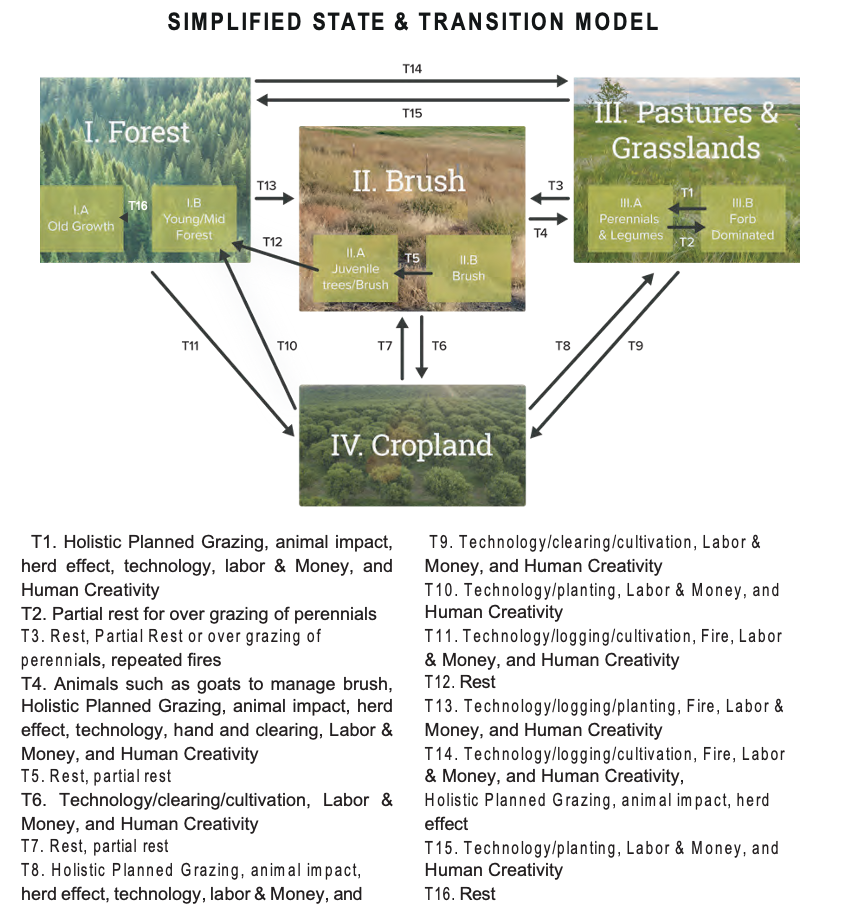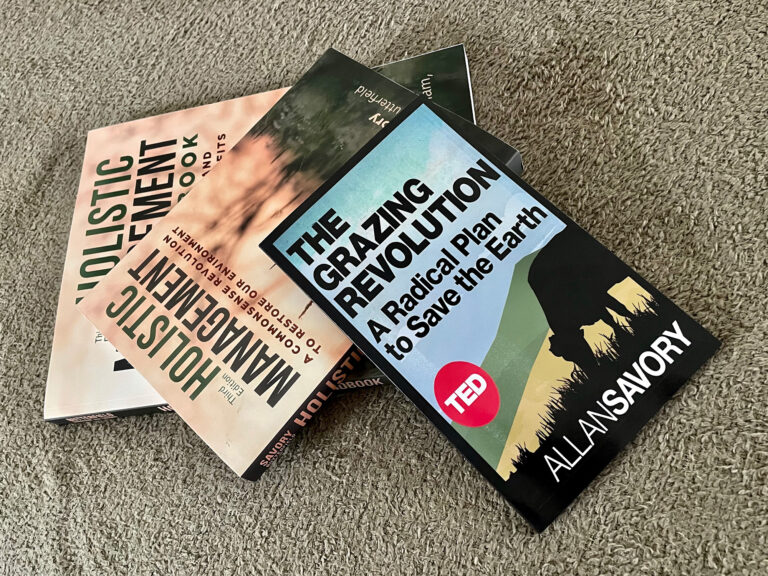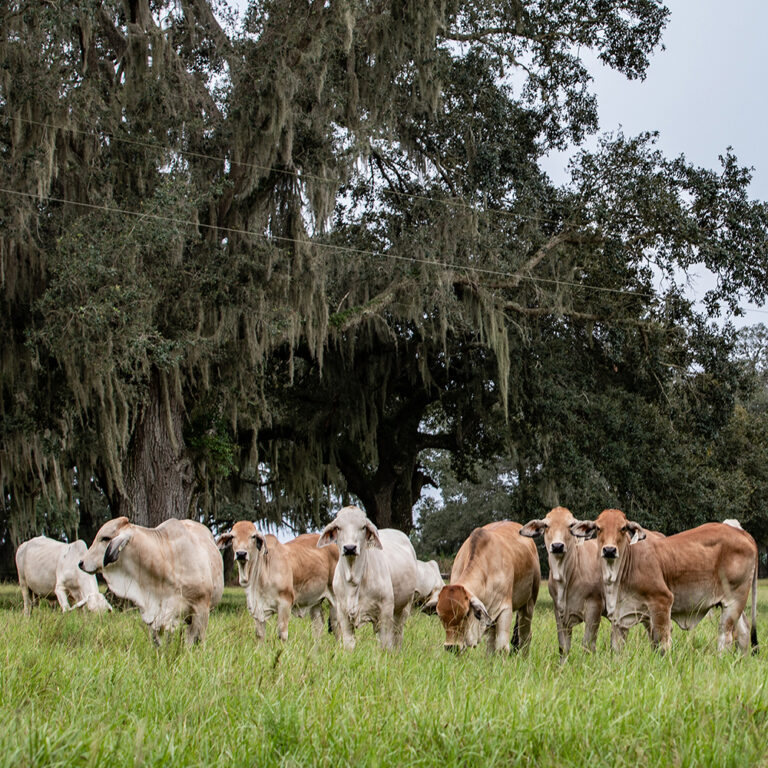On Tuesday, Oxford University hosted a debate between Allan Savory and George Monbiot on the merits of livestock grazing for mitigating the effects of climate change. Allan Savory — having dedicated his life to addressing the root cause of desertification and subsequently developing Holistic Planned Grazing which has been used by tens of thousands of farmers, ranchers, and pastoralists across the globe to regenerate their landscapes — argued in favor of livestock, while George Monbiot — a prominent environmental journalist whose recent book “Regenesis” argues in favor of lab-grown meat as an alternative to animal agriculture — argued against.
As could be expected from such a high-profile event, strong opinions were delivered from both sides, but did we really get to the truth of the matter? A debate stage, after all, is not a forum for discovering truth but rather of swaying opinion.
In the Savory Institute’s line of work, we care less about swaying public opinion and more about making real, tangible impact at the landscape level. Anyone whose livelihood depends on getting dirt under their fingernails knows that there is a symbiotic relationship between plants and animals, and no advancement in technology will ever rewrite that law of nature. A 2017 peer-reviewed paper titled “Who’s afraid of Allan Savory? Scientometric polarization on Holistic Management as competing understandings” found that those with first-hand knowledge and boots-on-the-ground experience with Holistic Management were able to more clearly see the positive impacts while those whose experience was more experimental or theoretical tended to take a stance of opposition.
This debate was a prime example of real-world versus theoretical experience. Allan and Monbiot have been battling it out on Twitter for years now, with Monbiot’s issues stemming from the following quote from Allan’s TED Talk:
“…people who understand far more about carbon than I do calculate that for illustrative purposes, if we do what I’m showing you here, we can take enough carbon out of the atmosphere and safely store it in the grassland soils for thousands of years, and if we just do that on about half the world’s grasslands that I’ve shown you, we can take us back to pre-industrial levels while feeding people. I can think of almost nothing that offers more hope for our planet, for your children, for their children and all of humanity…”
The ability for livestock to remove carbon from the atmosphere, claims Monbiot, is simply not supported by the scientific evidence. Instead, humans should remove animals from their pastures and instead take a hands-off approach so as to let nature “re-wild.” While this claim is often thrown at those of us in the field of regenerative grazing, the scientific consensus is far from settled. Ecosystem dynamics, after all, are infinitely complex, meaning that science will always be evolving its understandings as Mother Nature reveals more of her underlying patterns and principles.
One of these principles, taught as one of the four key insights of Holistic Management, is that landscapes with year-round moisture availability function quite differently than those with distinct growing and non-growing seasons. Monbiot’s hands-off “re-wilding” may sound like a panacea to someone coming from the moisture-rich United Kingdom where biological decay occurs freely, but across a much larger portion of the globe where brittle and arid landscapes have no other option for biological decay than the rumen of a grazing herbivore, a hands-off approach does not lead to lush vegetation or abundant forests but rather dead, oxidizing grasses and encroachment of bare ground.
As has been consistently demonstrated, domestic livestock can be managed as proxies of the former herds of wild herbivores and their predators. The strategic application of animal impact followed by rest provides grasslands with the appropriate stimulus needed to improve ecosystem function. These effects are shown clearly in State and Transition (S&T) catalogs which are reference guides used by ecologists to demonstrate the nuances of how, in different environments, different management actions deliver different outcomes.

Anti-livestock advocates like Monbiot fail to acknowledge the distinction between management outcomes on brittle and non-brittle landscapes as those of us managing holistically know all too well. Further, proponents of livestock removal offer no solutions addressing the problematic social, cultural, and economic impacts their re-wilding strategies would have for the non-brittle regions such as the UK and New Zealand that for centuries have developed through a pastoral culture and economy. If we are to let the man-made state of pastureland in these non-brittle regions remain, we can do so in a way that maximizes ecological health through Holistic Management.
For much of Allan’s career, there was scant evidence supporting the benefits of properly-managed livestock, and Monbiot hammered this tired point during the debate. In recent years, however, there has been a groundswell of new research, and not just theoretical models but real-world studies of Holistic Management practitioners. In multiple peer-reviewed journals, Holistic Management has been shown to regenerate ecosystem function and sequester significant amounts of carbon. While these rates are highly dependent on geography, climate, soil type, and other factors, sequestration rates often range from 0.5 to 7 tons of carbon per hectare per year. The Savory Institute has compiled various papers in our Science Library, and also in a searchable map to show the location of various published sequestration rates.
Furthermore, in 2020, Dr. Hannah Gosnell of Oregon State University published a comprehensive literature review titled “A half century of Holistic Management: what does the evidence reveal?”, outlining 50+ years of Holistic Management research, including the main tenets behind the decision-making framework and historical academic debates that stem from a narrow industrial paradigm before social-ecological frameworks were developed. Dr. Gosnell states:
“…the controversy over the effectiveness of HM can be traced back to the narrow terms in which HM was initially studied, at a time before social-ecological frameworks were developed. Studying a different agricultural paradigm was inhibited because—within an industrial farming paradigm—the only credible way to establish the value of an agricultural practice was to frame it in narrow, positivistic terms that removed the rancher as a thinking, adaptive agent, instead focusing solely on generic treatment efficacy for increasing forage, reducing desertification, and fixing carbon. […] A more holistic approach to co-producing scientific knowledge about HM, grounded in enhancing the capacity and agency of ranchers, should be seen as part of the system change that HM is attempting to leverage within agriculture.”
Monbiot’s approach falls squarely into the “narrow industrial paradigm” Dr. Gosnell warns about. In his opening remarks, Monbiot insisted that carbon sequestration is simply not adequate, and to address climate change livestock advocates must demonstrate permanent carbon capture in the soil. This demand, however, is the perfect example of applying reductionist thinking to complex living systems. Carbon is the backbone of all life, continually flowing between organisms to maintain a dynamic homeostasis. This delicate dance has occurred for billions of years, yet techno-utopianists insist we as humans have finally outsmarted nature and can therefore permanently remove carbon from its biogenic cycles. Instead of carbon flowing in service to life, it must be locked away forever. The audacity of such a proposition was felt by everyone in the room.
In addition to hurling insults at Allan — calling his work “pseudoscience,” “mumbo-jumbo,” “woo,” and even at multiple times “bullsh*t” — Monbiot made various false claims during the debate which Allan graciously did not call out but we feel the need to defend on his behalf:
- Monbiot continuously claimed that Allan chose the title of the debate so he could attack Allan for not wanting to discuss carbon. A screenshot of the email chain planning the debate clearly shows the title was the moderator’s choice and Allan merely accepted.
- Monbiot claimed that the photos used in Allan’s TED Talk had been debunked, yet when presented with evidence to the contrary by a Savory team member, Monbiot failed to provide any response.
- Monbiot claimed that Savory Institute was a consultant in a questionable carbon credit scheme in Kenya. It is possible that the Northern Rangeland Trust may be practicing Holistic Management or some derivation thereof, but the Savory Institute does not have a relationship with Northern Rangeland Trust or other players in said project. We do have a Savory Hub, the Mara Training Centre, that works with the Maasai pastoralists of the Enonkishu Conservancy, but they were not part of the referenced project.
- The most egregious claim, of course, is the one already discussed — that there is no evidence supporting Holistic Planned Grazing as a means to mitigating climate change. Allan stated in his opening remarks that he didn’t want to discuss carbon but rather wanted to discuss the root cause of our global crises (i.e. management), but where Allan skirted the topic the audience came armed with ample evidence. From personal anecdotes to figures straight from the IPCC report, they continuously challenged Monbiot’s claims with counter-evidence. For someone so adamant on scholarly works being the ultimate verifier of truth, Monbiot had little to offer in response to the audience’s referenced works.
He further conflated feedlots and Holistic Planned Grazing, attempting to justify the elimination of all livestock because of the abhorrent practices found in industrial animal agriculture. Time and time again we are forced to bring nuance into the conversation, explaining that feedlots are in no way representative of what we at the Savory Institute teach and advocate for, and that we share Monbiot’s desire to eliminate factory farming. Where we differ, however, is in our methodology. We don’t believe the baby should be thrown out with the bathwater. The alternative to industrial animal agriculture is not industrial cropland production or goo made in stainless steel vats (side note: the “cell-based meat” Monbiot advocates has a long list of hurdles that scientists don’t believe it will be able to overcome.) Instead of coming up with yet another energy-intensive solution that puts a band-aid over the bullet hole, let’s address the root cause and work with nature, not against it.
If we truly want to address climate change, we need to expand the discussion beyond greenhouse gases which, of course, are a critical component, but in isolation do nothing to address the massive loss of biodiversity and broken water cycles that feed into vicious feedback loops expressed as climate change and other global crises. Bare ground, after all, is inhospitable to life. Without carbon-based lifeforms present in an ecosystem, our global carbon cycle and the interconnected water cycle and energy flows spin out of control.
In the very same Oxford auditorium, a mere 163 years prior, another contentious topic was discussed. Darwin’s theory of evolution was debated by Samuel Wilberforce and Thomas Huxley in what become known as The Great Debate. Their performances that day were inconsequential to the truth of the matter. Evolution, as we have all come to know, is how the world works, and it is that co-evolved relationship between grasslands and grazing herbivores that remains true no matter what side of the aisle you sat on in this debate.
The Savory Institute remains committed to the inclusion and consideration of all evidence as we as a species look to deepen our understanding and stewardship of global grasslands. This includes scientific evidence (as presented above and also in ongoing research partnerships with Colorado State University, Michigan State University, Woodwell Research Center, and the Noble Institute), the decades of first-hand experience from the tens of thousands of Holistic Management practitioners which Monbiot dismisses as anecdotal, the breath-taking transformations seen in photographs and satellite imagery, EOV monitoring data that is now being collected on over 4 million acres, and more. All of this evidence is valuable and allows us to stand in reverence and honor the natural world to which we belong.




